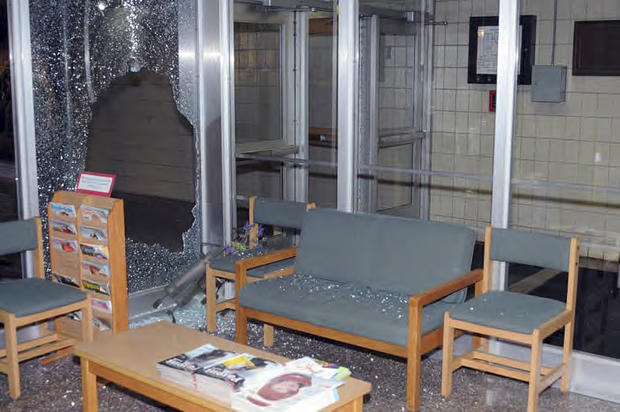Newtown 911 calls shed light on shooting chaos
HARTFORD, Conn. -- Recordings released
Wednesday of 911 calls from the Sandy Hook Elementary School shooting show town
dispatchers urged panicked callers to take cover, mobilized help and asked
about the welfare of the children as the boom of gunfire could be heard at
times in the background.
One caller told police in a trembling, breathless voice that a gunman was shooting inside the building.
"I caught a glimpse of somebody. They're running down the hallway. Oh, they're still running and still shooting. Sandy Hook school, please," the woman said.
Complete coverage: Newtown shooting
The calls were posted on the town's website under a court order. CBS News was among numerous media outlets that pushed for the tapes to be released for review.
"Keep everybody calm, keep everybody down, get everybody away from windows, OK," the dispatcher said.
Another woman, who was shot in the foot, reported that she was in a classroom with children and two other adults, but that there was no way to safely lock the door. The dispatcher told her to apply pressure to the wound.
"OK, are you OK right now?" the dispatcher asked.
The woman replied: "For now, hopefully."
One of the first calls came from a custodian, Rick Thorne, who said that a window at the front of the school was shattered and that he kept hearing shooting. While on the line with Thorne, the dispatcher told somebody off the call: "Get everyone you can going down there."
Thorne remained on the phone for several minutes.
Dispatch recordings have previously shown the first 911 call came in just before 9:36 am. The first officer arrived a minute and a half later. The tapes indicate officers were inside the school by 9:44.
The gunman, 20-year-old Adam Lanza, shot his way into the school the morning of Dec. 14 and killed 20 children and six educators with a semi-automatic rifle. He also killed his mother in their Newtown home before driving to the school.
It's not clear whether the delay made a difference because Lanza killed himself one minute after the first officer arrived on the scene, according to the report.
In one of the recordings released Wednesday, dispatchers were heard making calls to Connecticut state police that apparently rang unanswered. One of the three unanswered calls rang for at least 50 seconds. State police picked up on a fourth call.
But state police had already been dispatched to the school by the time those calls were made, according to a timeline and call log supplied by Newtown officials.
In all, seven recordings of landline calls from inside the school to Newtown police were posted Wednesday. Calls that were routed to state police are the subject of a separate, pending a freedom of information request.
As the town prepared to release the recordings, the superintendent of Newtown schools, John Reed, advised parents to consider limiting their families' exposure to the media.
The prosecutor in charge of the Newtown investigation, State's Attorney Stephen Sedensky III, had argued that releasing the tapes could cause pain for the victims' families, hurt the investigation, subject witnesses to harassment and violate the rights of survivors who deserve special protection as victims of child abuse.
A state judge dismissed those arguments last week and ordered the tapes be released Wednesday unless the state appealed.
"Release of the audio recordings will also allow the public to consider and weigh what improvements, if any, should be made to law enforcement's response to such incidents," Superior Court Judge Eliot Prescott said.
"Delaying the release of the audio recordings, particularly where the legal justification to keep them confidential is lacking, only serves to fuel speculation about and undermine confidence in our law enforcement officials."
"I don't feel that the actual audio tapes serve any public interest, necessarily," she told CBS News correspondent' Elaine Quijano. "They don't teach us anything new."
Nelba Marquez-Greene, whose daughter Ana was killed, told Quijano she didn't need the tapes to tell her about law enforcement's response to the shootings.
"I don't need to hear the tapes to know that the men and women in our local and state police did everything they could that day in order to help protect our children and the staff at Sandy Hook Elementary School," she said.
Last month, Sedensky released a report on the shooting that said that Lanza had an obsession with mass murders, particularly the 1999 shootings at Columbine High School in Colorado. But the report concluded there was no evidence he had indicated to others an intention to carry out such a crime.The report said Lanza had significant mental health issues that affected his ability to live a normal life and interact with others but did not affect his mental state for the crimes.
"The obvious question that remains is: 'Why did the shooter murder twenty-seven people, including twenty children?' Unfortunately, that question may never be answered conclusively," the report said.
In the past year, many school districts nationwide have beefed up security, but efforts to establish background checks for firearm purchases that could limit access for the mentally ill have gone nowhere.
